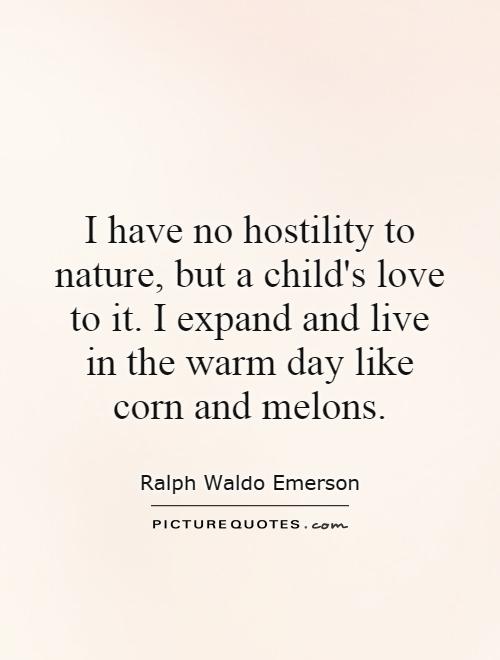I have no hostility to nature, but a child's love to it. I expand and live in the warm day like corn and melons

I have no hostility to nature, but a child's love to it. I expand and live in the warm day like corn and melons
Ralph Waldo Emerson, a prominent figure in the transcendentalist movement of the 19th century, was known for his deep connection to nature and his belief in the inherent goodness of the natural world. In his essay "Nature," Emerson expresses his profound love and admiration for the beauty and power of the natural world, likening his relationship to nature to that of a child's innocent and pure love.Emerson's statement, "I have no hostility to nature, but a child's love to it. I expand and live in the warm day like corn and melons," reflects his belief in the harmonious relationship between humans and the natural world. He sees nature not as something to be conquered or dominated, but as a source of inspiration and renewal. Like a child who is in awe of the world around them, Emerson approaches nature with a sense of wonder and reverence.
Emerson's comparison of himself to corn and melons growing in the warm sun speaks to his belief in the interconnectedness of all living things. Just as plants rely on the sun for nourishment and growth, Emerson sees himself as a part of the natural world, thriving and expanding in harmony with his surroundings. This idea of unity and interconnectedness is a central theme in Emerson's philosophy, as he believed that all living beings are connected in a vast web of existence.
Emerson's deep love for nature is evident in his writings, where he often describes the beauty and power of the natural world in vivid detail. He saw nature as a source of spiritual nourishment and inspiration, a place where one could find solace and renewal in the midst of a chaotic and materialistic world. For Emerson, nature was not just a physical reality, but a spiritual force that could awaken the soul and connect us to something greater than ourselves.












 Friendship Quotes
Friendship Quotes Love Quotes
Love Quotes Life Quotes
Life Quotes Funny Quotes
Funny Quotes Motivational Quotes
Motivational Quotes Inspirational Quotes
Inspirational Quotes